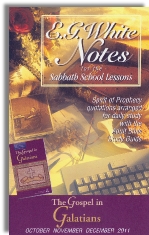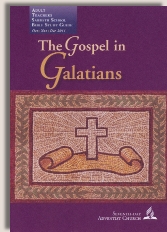|
||||||||||||||
Commentary on "The Unity of the Gospel"
Day 5: Wednesday, October 12, 2011 - Confrontation in Antioch
Overview
The scene moves quickly forward to another meeting between Paul and Peter, this time in Antioch where the gentile Christian church was born. It involves Peter's hypocrisy in changing his behavior, from sharing a meal with the gentiles to changing course rapidly when some Jewish Christians from James spotted him at the table with gentiles. The adventist author doesn't forget to mention that Peter's actions were labeled by Paul as hypocritical, even if a reason for this assessment is left for the next day of the study lesson. Predictably, in harmony with the Adventist understanding of food laws, any thought that Peter would eat gentiles' foods not allowed by Leviticus 11 is rejected, on the basis of an argument from silence. The author argues that Peter's abandonment of the food standards would have brought an uproar in Jerusalem, but that there is no record of such an uproar.
Observations
We may grant that arguments from silence, even if they don't have as much force as arguments based on concrete evidence, still cannot be dismissed with a wave of the hand. But the writer of this present commentary cannot but wonder if the Adventist mindset will accept an argument from silence regarding the non-existence of a big confrontation regarding the Sabbath - Sunday day of worship in the early days of the Christian Church. They argue that the silence is an implicit proof that the gentile Church embraced the Sabbath, because there is no proof of conflict with the Jewish church. Assuming that they are right, why was there no big conflict after the apostles died, in the second century, or even in the third, around the day of worship? Why was the transition to the Lord's Day so smooth? If the apostles imposed the keeping of the Sabbath on the gentile Christian churches, a post-apostolic abandonment of the Sabbath in favor of Sunday would have become evidence in the history of the Church of an important conflict. Many challenges faced the church, but the conflicts that plagued the early post-apostolic church in the first three centuries circle around other hot topics such Jesus Christ's two natures; there are no conflicts over worship days.
There is a good reason why Peter would have eaten non-kosher foods at Antioch; the gentile church was not brought under the obligation to keep the Mosaic covenant, including the kosher foods. The uproar stirred by Peter which the Adventist author looks after had already happened when Peter had the vision when he had been commanded to eat non-kosher foods and afterward went to Cornelius and baptized his house. Peter was criticized by the other leaders for his close association with gentiles, but his explanation won a preliminary victory that was later sealed at the Council of Jerusalem. There are good reasons to think that the confrontation at Antioch took place before the Council of Jerusalem and that the epistle to the Galatians was written before that event.
First, there is no mention of the decision of the council in the letter, where it should be, since Paul uses the endorsement of the apostles. Why talk about a private meeting where you explained your gospel in a detailed way, if you have a public, visible, powerful decision of the leaders endorsed by a letter? If Paul writes Galatians after the Council of Jerusalem, he fails to bring the strongest proof in his favor, opting for a weaker proof of apostolic endorsement. Also, Peter's change of tables, under strong peer pressure, points to a moment before the Council, because the Council's decision would have weakened the pressure exercised by the Judaizers. Peter would have had an official backup apostolic letter to repel the opposition.
The Council of Jerusalem decided to relieve the Gentile churches of the burden of keeping the Mosaic covenant, including circumcision, kosher foods, Sabbath (Acts 15:10). The Jewish church continued to respect Torah as part of the Jewish custom—not as an obligation, while the Gentile church continued to eat what they had eaten until that point. This means that there is no reason to assume that Peter ate kosher food with gentiles at Antioch, because the gentiles had not been required, either before or after the Council at Jerusalem, to respect kosher foods. These laws were seen as a part of a bigger package, the entire Mosaic system, and the debate around circumcision was a debate around the question, "Should the gentile Christian be under the obligation of the Mosaic covenant en-toto, as a whole? Should they embrace the entire package, starting with circumcision and continuing with kosher foods, sacrifices, annual celebrations, sabbaths, etc?" The answer was a clear no, and there is no reason to think that the gentile Christians at Antioch respected kosher laws. Even Paul's question to Peter betrays that Peter abandoned the Jewish kosher foods, living as a Gentile (Galatians 2:14), referring most likely to Peter's behavior at the table. If Peter would have eaten kosher foods, how would his behavior be taken as distinctive from Jewish behavior? He would have been living like a Jew. It makes little sense to argue that Peter's eating at the table with Gentiles would be in the perimeter allowed by the kosher foods.
The vision Peter had when he was commanded to eat non-kosher food, unclean animals, is significant because God explicitly told him that he cleansed those animals. While it may be argued that this thing refers to gentiles who were perceived as unclean, this misses the force of the argument. It was not sinful Jewish custom that separated them from gentiles; it was the Torah, the laws given by God himself to Israel in order to make them a peculiar people, separated from the other nations. As Peter explicitly told Cornelius (Acts 10:28) it was unlawful, against the law to associate with those uncircumcised, and the law had to be dealt with before any association would be legal. Through the vision God told Peter in clear terms that what in the past under the Mosaic covenant was not lawful, now was lawful, because He used foods which previously were not lawful to eat to tell Peter that now it's lawful to eat. God taught him a lesson. If it was still unlawful to eat kosher foods, it was still unlawful to associate with gentiles. The same Mosaic covenant condemned both actions.
It remains for the next day of the study lessons to close the case of Antiochian confrontation and tie it with the defense of the gospel. It seems that, from concerns for their own standards regarding kosher foods, the adventist author can't see the forest for the trees, he can't see that the gospel without other strings attached united the Jewish and the Gentile Church. Beside it, the two communities lived accordingly to their backgrounds, the Jews continued to circumcise their kids, participated at the temple, brought sacrifices, kept the sabbaths, new moons and feasts, while the Gentiles remained Gentiles, without being forced to circumcise, bring sacrifices, keep sabbaths, new moons, annual feasts.
Then in 70 AD the Jewish community was dispersed and never recovered historically after this blow, while the church which remained was the Gentile church. The things related to the Old Covenant which the Jewish Church still practiced out of custom died a natural death, and what remained was a Gentile church built entirely on the New Covenant.
The gospel without other strings attached won that battle, but the issues raised by Judaizers are still alive.
Copyright 2011 BibleStudiesForAdventists.com. All rights reserved. Revised October 11, 2011. This website is published by Life Assurance Ministries, Glendale, Arizona, USA, the publisher of Proclamation! Magazine. Contact email: BibleStudiesForAdventists@gmail.com.
The Sabbath School Bible Study Guide and the corresponding E.G. White Notes are published by Pacific Press Publishing Association, which is owned and operated by the Seventh-day Adventist church. The current quarter's editions are pictured above.
Official Adventist Resources
Standard Edition Study Guide Week 3
Teacher's Edition Study Guide Week 3
Easy Reading Edition Study Guide Wk 3
Search the Complete Published Ellen G. White Writings
Please Support This Project


